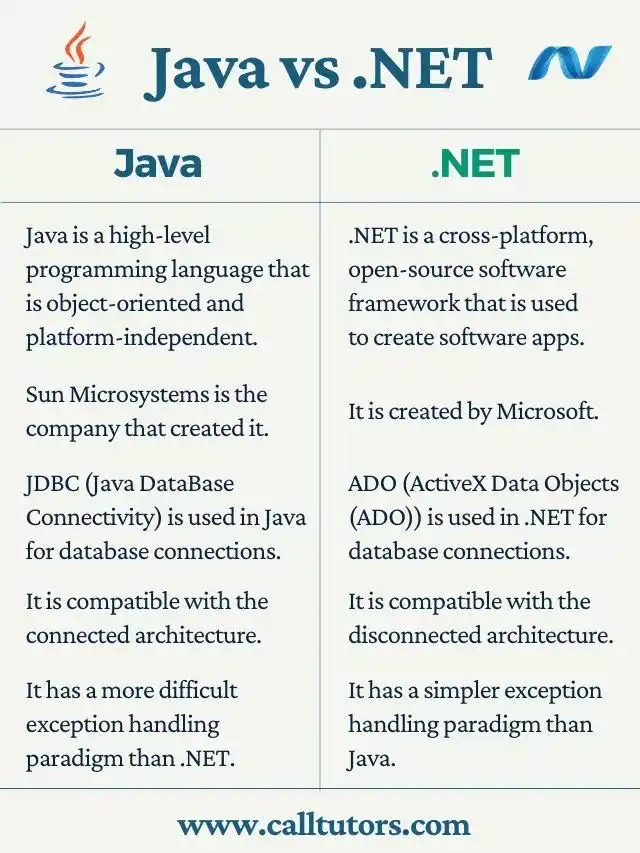In the ever-evolving world of software development, two titans stand tall: Java and .NET. These powerful frameworks have revolutionized the way applications are built, offering developers a plethora of tools and capabilities.
While both share the goal of simplifying the development process, they differ in their approaches, strengths, and target markets.
This blog post aims to provide an in-depth analysis of these two behemoths, Java vs .NET, exploring their histories, architectures, performance metrics, and real-world applications.
Whether you’re a seasoned developer seeking to expand your expertise or a newcomer trying to navigate the intricate landscape of programming, this comparison will shed light on the pros and cons of each framework, empowering you to make informed decisions for your next project.
Introduction To Java
Table of Contents
Java is an object-oriented high-level programming language, and it is platform-independent. Sun Microsystems created Java. It is considered to be the foundation for almost any form of networked application.
We may use the Java programming language to create and provide worldwide standard embedded programmes, mobile apps, business apps, games, web-based content, among other things.
Introduction To .NET
.NET is a cross-platform, open-source software framework that is used by Microsoft to create software apps. It enables the development and operation of next-generation apps and online services.
We may construct reusable modules with the aid of .NET, which makes the apps code error-free and increases productivity.
Java vs .NET: The Key Differences
Operating System
The primary difference between Java and .NET is that Java can operate on any operating system via its compilers and JRE (Java Runtime Environment), as it adheres to the “write once, run anywhere” approach.
In contrast, .NET is limited to the Windows operating system and its many versions.
There are a few open-source versions of .NET, but they are still mostly aimed towards Windows users. Java Virtual Machine enables Java code to run on any platform with any operating system.
This provides Java a significant edge over .NET since it is platform-independent and unquestionably more portable.
Integrated Development Environment (IDE)
An IDE is a software solution that provides you with the tools you need to design and test software applications.
Microsoft Visual Studio is the default .NET IDE, whereas Oracle JDeveloper, Oracle NetBeans, Eclipse, and IntelliJ Idea are the leading Java IDEs.

Support For Programming Languages
Many programming languages are supported by Java and .NET. JavaScript, Scala, Groovy, and Clojure are available to Java developers, whereas F#, VB.NET, C#, and C++ are available to .NET developers.
Both include support for lesser-known programming languages, although the J2EE framework uses Java as the default language.
What is Applicant Tracking System? ATS stands for Applicant Tracking System. It’s a human resources software that acts as a database for job applicants Applicant tracking systems (ATS) are used by companies of any size to organize, search, or communicate with large groups of job applicants. Best Applicant Tracking System (ATS) in 2022 Best applicant tracking software in 2022 shortlisted is Freshteam, Corwin, TalentRecruit, TalentOrb, and CEIPAL. ATS streamlines the recruitment process and helps managers filter the best applicants for vacant job positions.
With .NET, you have interoperability with other popular languages like F# and C#, which gives you greater options while working on corporate applications.
Performance
In terms of performance, Java’s syntax is developed from C and C++, therefore there are many parallels between Java and .NET. However, because Java is platform-independent, its code may be run everywhere.
.NET provides a general-purpose and easy programming language that includes type checking, array limits, garbage collection, and uninitialized variable checks.
This increases durability, robustness, and efficiency. Only unchecked and checked expectations are highlighted in Java arrays.
Aside from these differences, the performance of .NET and Java is quite identical.
Community
Java has been around for a quite long time and always has been platform-independent. As a result, it has collected a huge developer community that has spent years developing web, mobile, and desktop programmes that operate on a number of platforms.
In contrast, the .NET community is smaller than the Java community. So, in the war of Java vs .NET: community, Java comes out on top. A broad community is advantageous since they can always give assistance or share their knowledge collected through time.
Java vs .NET: In Tabular Form

| JAVA | .NET |
| Java is a high-level programming language that is object-oriented and platform-independent. | .NET is a cross-platform, open-source software framework that is used to create software apps. |
| Sun Microsystems is the company that created it. | It is created by Microsoft. |
| JDBC (Java DataBase Connectivity) is used in Java for database connections. | ADO (ActiveX Data Objects (ADO)) is used in .NET for database connections. |
| It is compatible with the connected architecture. | It is compatible with the disconnected architecture. |
| JVM (Java Virtual Machine) is required for Java execution during runtime. | CLR (Common Language Runtime) is required by .NET for execution means during runtime. |
| There are several third-party IDEs (Integrated Development Environments) available for Java. | It comes with a standard IDE (Integrated Development Environment), Microsoft Visual Studio. |
| It is a third-party system that supports many operating systems. | It only works with the Windows operating system. |
| When compared to .NET, Java’s trash collection is less efficient. | When compared to Java, .NET delivers a more efficient method of garbage collection. |
| When it comes to security, it lags behind .NET. | It is a step forward in terms of security. |
| It has a more difficult exception handling paradigm than .NET. | It has a simpler exception handling paradigm than Java. |
Java vs .NET: Advantages And Disadvantages
Advantages And Disadvantages of Java:
There are so many advantages and disadvantages of Java and some of them are the followings which are shown below:
| Advantages | Disadvantages |
Advantages And Disadvantages of .NET:
There are so many advantages and disadvantages of .NET and some of them are the followings which are shown below:
| Advantages | Disadvantages |
Java vs .Net: Performance
According to the Google Trends data shown in the image, the search interest for “Java” has consistently been higher than that for “.NET” over the past 5 years worldwide.
The blue line representing “Java” shows higher peaks and overall interest levels compared to the red line representing “.NET”.
While both technologies have experienced fluctuations in search interest, Java has maintained a more significant lead throughout the time period displayed.
It’s important to note that this data reflects search interest trends and not necessarily direct performance metrics or usage statistics for the two technologies.
However, the higher search interest for Java could potentially indicate greater popularity, adoption, or interest among users during this time frame when compared to .NET.
Java vs .Net: Salary Comparison
Based on the salary information provided by Glassdoor, here’s a comparison of salaries for Java and .NET developers:
Java developers can expect a total pay range of USD 103K to USD 152K per year. The most likely range for base pay is USD 87K to USD 122K, with additional pay ranging from USD 16K to USD 30K.
For .NET developers, the total pay range is USD 108K to USD 156K per year. The base pay range is USD 94K to USD 130K, and additional pay can be between USD 14K and USD 27K.
It appears that .NET developers generally have a slightly higher salary range compared to Java developers, both in terms of base pay and total compensation. However, the salary ranges overlap significantly, indicating that compensation can vary based on factors such as experience, location, and specific industry or company.
It’s important to note that these salary figures are estimates and may not reflect the compensation in all regions or companies. Additionally, factors like skill level, job role, and industry can greatly influence earning potential for both Java and .NET developers.
Java vs .Net: Job Opportunities
Java and .NET are both popular programming languages and frameworks with a wide range of job opportunities available. However, the job market for each can vary depending on factors. Here’s a general overview of the job opportunities for Java and .NET:
Java
1. Enterprise Applications: Java is widely used for developing large-scale, robust enterprise applications, particularly in industries like finance, telecommunications, and e-commerce. This creates a high demand for Java developers in these sectors.
2. Web Development: With frameworks like Spring and JSF, Java is extensively used for web application development, leading to opportunities for Java web developers.
3. Mobile Development: Although Java was initially not designed for mobile development, with the introduction of Android, Java has become a popular language for developing Android applications, creating numerous job opportunities for Android developers.
4. Big Data and Analytics: Java is widely used in big data technologies like Apache Hadoop, Apache Spark, and various data processing frameworks, resulting in job opportunities in data engineering and data analysis roles.
.NET
1. Windows Applications: .NET is the primary framework for developing desktop applications for Windows operating systems, creating job opportunities for .NET developers in various industries that require Windows-based software.
2. Web Development: With ASP.NET and other web frameworks, .NET is extensively used for web application development, leading to job opportunities for .NET web developers.
3. Enterprise Applications: .NET is commonly used for building enterprise-level applications, particularly in industries with a strong Microsoft presence, such as finance, healthcare, and government organizations.
4. Mobile Development: With Xamarin, .NET can be used for cross-platform mobile app development, creating job opportunities for mobile developers proficient in .NET.
Cloud Computing: With Microsoft’s Azure cloud platform, .NET developers are in demand for building and deploying cloud-based applications and services.
Conclusion: Java vs .NET
In this blog, we have discussed Java vs .NET. And, for the students to understand the essential differences between the terms Java vs .NET is very helpful. But if in any case, you need assistance regarding Java Homework Help then feel free to contact us. We are always available to help you.
FAQs Related To Java vs .NET
Which is easier .NET or Java?
Because .NET is a local framework available with Windows, it is recommended for developing Windows-based apps. Furthermore, many programmers find it easier to construct web applications in .NET than in Java.
Is .NET similar to Java?
Java is a high-level programming language that is object-oriented and platform-independent. .NET is a cross-platform, open-source software framework that is used to create software apps.
Is .NET more secure than Java?
.NET and Java, as well as the complexity/size of websites and apps created in these languages. More significantly, there is no proof that .NET or Java are less secure than the other languages.



